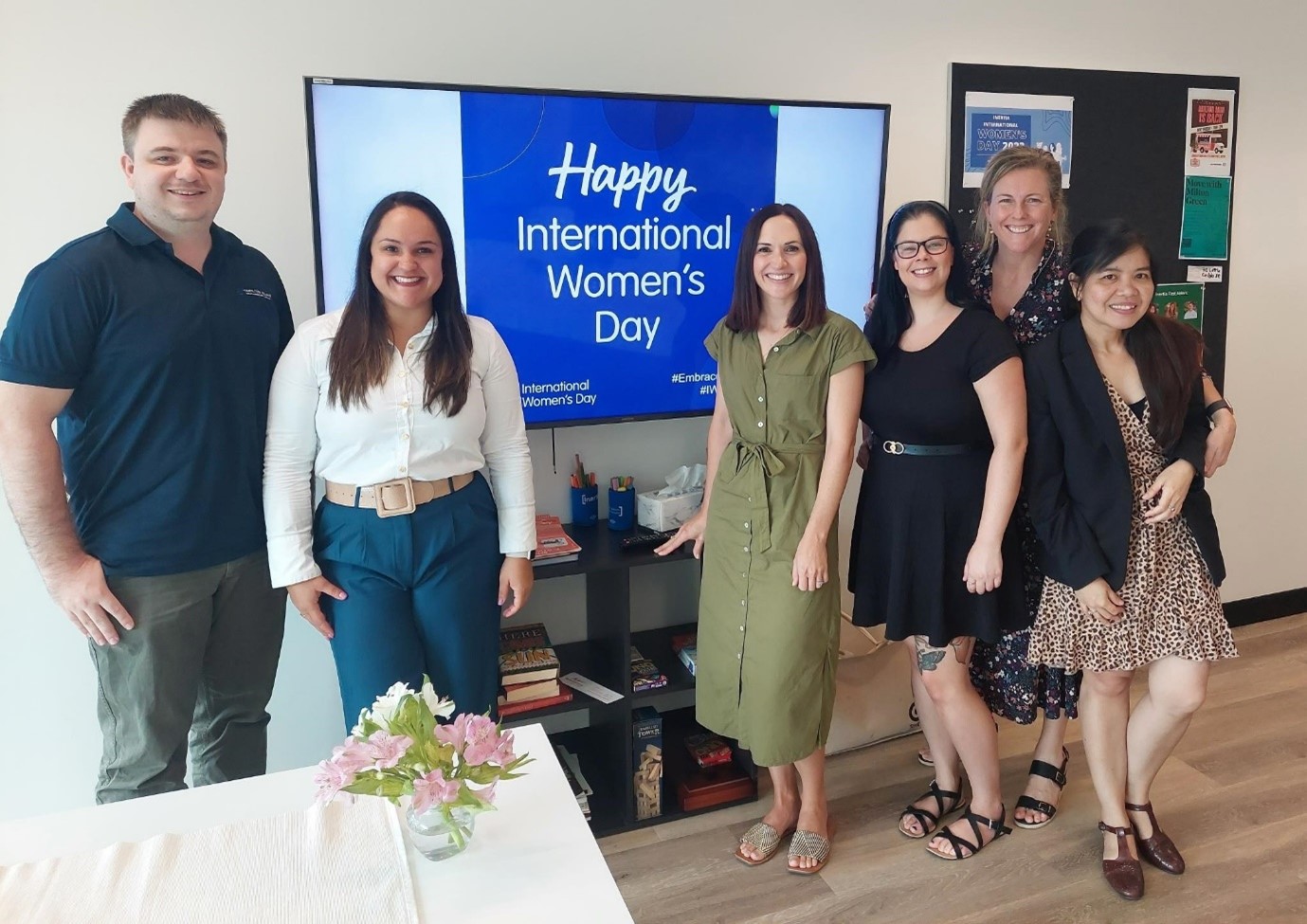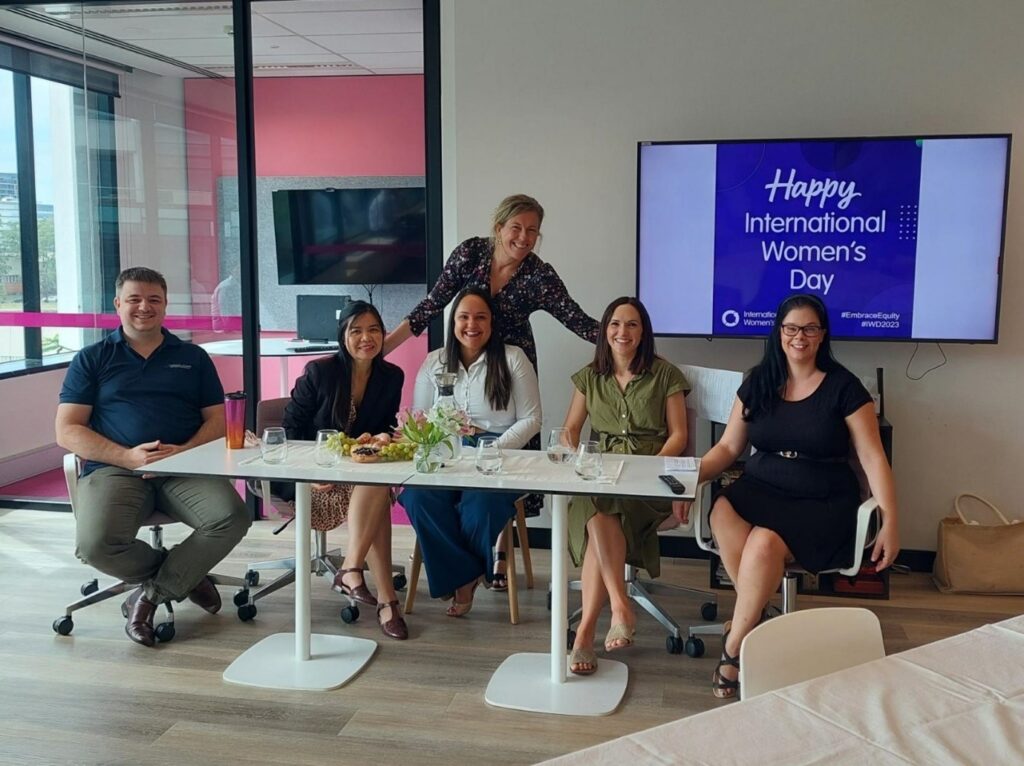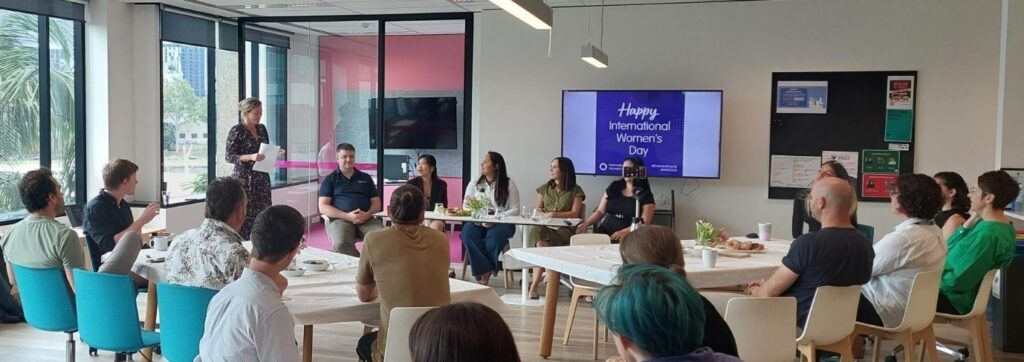Inertians Embrace Equity through Shared IWD Stories

To celebrate International Women’s Day, we hosted a special team event at our office. We held a morning tea and a Q&A session moderated by Emma Clements featuring an amazing panel of Inertians who shared their stories, experiences, hopes and motivations for a more inclusive future for all.
As each team member outlined a little bit about themselves, the depth of experience, differing backgrounds, work histories and experience, and family life it became clear that we would be in for a valuable session.
What does embracing equity mean to you?
Honeylette – The idea of equity is something that has grown in the last couple of years. When I was at Uni, equality was becoming accepted there were female engineers but equality was being treated as “you are here, off you go and prove yourself. So, every day was a challenge to show we belonged and could be valued. Equity is different, it’s not about equal opportunity; for me, it is about trust and support. We can do anything that men can do, but not if we are not trusted or supported. Trust empowers us – trust us, and we can support you in turn and be an amazing team.
Luke – For me, equity is about how I treat everyone else. I haven’t had the impacts on me that the other panellists have; I have had to prove myself, but not under the same pressure or scrutiny. So, what I try to do is make sure that every day I work with someone, I make sure that they know that their thoughts, opinions and ideas matter, carry as much weight as anyone’s and should be listened to and valued.
Stacey – It is all about fairness and encouragement and giving everyone the same opportunities regardless of their background, history and start in life. We all come from different backgrounds, so not everyone, for example, can afford to go to uni, that’s why scholarships are important; they actively encourage people to have the same opportunities. That’s equity, it is fairness.
Cinthia – I am from Brazil and my parents have always said that we must go and make things happen, because they couldn’t always afford things or be supported. I knew the only way to do it was to study and start working as soon as possible. Many people I went to high school with didn’t have the same opportunities, so we had to make opportunities happen. Everyone should be able to access the same opportunities even though we are from different backgrounds. Australia is different, you can have a good life as a drafter or as an engineer.
Jo – for me and my sphere of influence, it is about bringing my kids up with honour and respect for other cultures and other people’s way of living, but also teaching them life skills and not gender stereotypes; girls can mow the lawn, boys can sew. It’s about removing unconscious cultural biases.
What’s been your biggest life challenge?
Cinthia – moving overseas and not speaking the language. I couldn’t order food; I couldn’t say more than ‘hi’. Being patient and trusting the process was hard, and so was turning down opportunities to go home and work. My parent’s questioned why I worked so hard to become a cleaner, but it was part of the process and I trusted it to get me where I am now.
Jo – Having twins. Physically and emotionally, it was hard; my husband travels a lot with work, we don’t have family close by, and I was taking care of 4 kids on my own all day, every day. Looking back now, I can see the value of staying at home to support the next generation, but when you forget that and look back, it can feel a little bit like the endless hamster wheel. At work, you get validated and praised for your efforts, sometimes we don’t get that from our kids.
Luke – Understanding what it is like to be a woman. I don’t know if privileged is the word, but I fit into a stereotype and haven’t had to face the challenges everyone else has. My daughter is 6 months old and it scares me. Will she face the challenges the panellists have faced?
Honeylette – Raising three women as a single parent. My children are in the Philippines and they are growing up; they need my support more than ever and I am in Brisbane trying to provide more opportunities for them, such as paying for their studies and raising them through online communication. Trying to prove I can do it on my own is tough. It is rewarding to raise three amazing young women, but it certainly is my greatest challenge.
Stacey – Studying. I moved home a lot and went to many different schools so getting continuity was a challenge. I also had a tumour, which meant I lost hearing in one ear and that was a challenge. People didn’t understand and teachers thought I was difficult. I started work at 13 as I knew I wanted to study, so it was my way of saving for my education. Everyone has different challenges and we don’t always see them, so we need to ensure everyone can reach their goals regardless of their challenges.
What progress have you seen on gender equality in your life and work?
Luke – I’ve been in the workforce for 12 years and in that time, I’ve seen an increase of women in the industry and that’s great. The biggest change I have seen is encouragement and support, it is better now than it was.
Stacey – Encouragement for women, there are new groups, and new committees that support women and provide mentoring. I have applied to be a mentor and a mentee and hope to be able to learn as well as repay the encouragement the networks are providing me.
It is clear from the stories of our Inertians that as a society and industry, we have come a long way, but we are far from where we need to be and initiatives like International Women’s Day are key to changing attitudes and perspectives. As an organisation, equity and fairness are central to our future, and we were honoured that Honeylette, Stacey, Cinthia, Jo and Luke shared their honest experiences and aspirations.
 Back to News
Back to News


